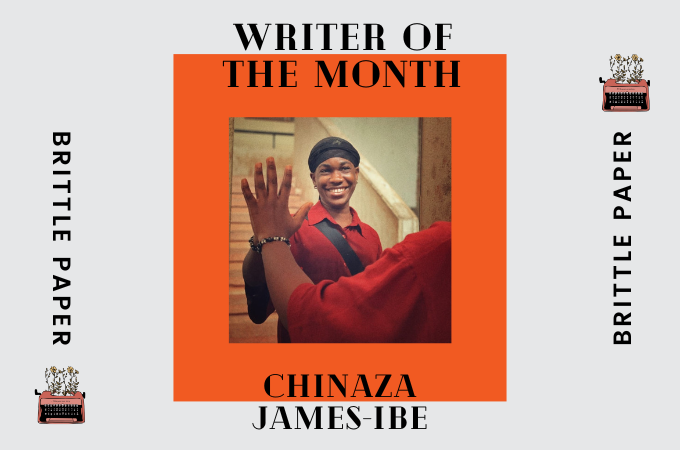
Brittle Paper’s Writer of the Month for November is Chinaza James-Ibe!
Chinaza James-Ibe is a Nigerian writer who is currently an undergraduate of English and Literary Studies at the University of Nigeria, Nsukka. Her writing deifies her, and she is quite drunk with the feeling of creation and destruction. She is currently the associate prose editor for The Muse Journal, and her works can be found on Agbowo, Kalahari Review, Fiery Scribe, Readers Boon, OneBlackBoyLikeThat, Arkore, and elsewhere.
Aside from her writing, Chinaza is so intrigued by nature that she loves to capture its beauty through photography. She is also passionate about fashion and with time, she wishes to make a name in both the fashion and literary world. Her other hobbies include thinking, listening to music, scrolling on Tumblr and Pinterest, reading, and listening to macabre podcasts. Her music taste is diverse enough to contain her various personalities, as she can go from Bess Atwell to Asa Quana in no time at all.
Chinaza thinks everything about Japan is aesthetic, including its words. She wishes to travel there and dabble in the arts of Kishotenketsu and Zuihitsu whilst laying down in a pool of wisteria petals and pretending to be everything all at once. You can find more of her thoughts on Facebook as James-Ibe Chinaza, and on Instagram as yellowin_teeth.
Without further ado, let’s sit down with our Writer of the Month!
Brittle Paper
Chinaza, congratulations on being our November Writer of the Month! Your piece “Bones” is such striking piece. I remember going through the submissions and, just from the opening lines, I was already convinced. How can you not be intrigued by such an attention grabber!
But, first things first, tell the people who/what made Chinaza pick up the pen and become the writer who spoils us with beautiful words?
Chinaza James-Ibe
First of all, I must thank you for making me Writer of the Month. I am infinitely honored! To be honest, I had very little expectations for “Bones,” and I was chuffed, as well as surprised when the mail came in. Thank you!
Writing for me is like becoming not just myself but a lot of things! I was born in Lagos, and the beginnings of my life was confined to a single place—our compound, and later it was constricted to just our home. Finally, I crept into my mind and stayed there for a long time. Being quite the introvert herself, my mother made sure we stayed indoors, so my three siblings and I found ways to travel the world and be anything we wanted to be from the confines of our home. When we were bored, we would all lay on our beds and “watch cartoons in our head.” This was how I first discovered imagination, and I loved the taste of it (still do). I bet my mother did not know she was raising children who could look at two lizards on a wall, and weave an entire narrative from it.
My elder sister further led the way by writing stories we would all take turns to read. She was so good at it that we all started writing our stories—after our chores we would all sit at the dining table and write stories we would read and enjoy by ourselves—this was the beginning for me. My first little book as a child was a fantasy tale titled “Fairy Tale,” and I felt like a god! Like, “do you really mean I can create whatever I want, however I want?” Who would want to let go of such power?
I also read a lot of books that were quite “heavy” for my little brain. My mother had to buy me the first novel I ever owned, The Little Lost Angel. When we relocated to Imo eight years after my birth, my writing took quite the melancholic turn. I don’t how or why. I was just eight but I was writing a book titled The Endless Tragedy, in which I killed every single character in my story (including the protagonist), in gruesome manners. Perhaps it was just me testing the waters of my self-acclaimed godhood. [laughs] As time goes by, my writing is evolving greatly, but it still makes me feel like a god.
Brittle Paper
That is one of my favourite responses! I think a lot of readers will relate to the way we came into our imaginations and realised creating stories was something we could do whenever we wanted to. I am curious to know more about The Endless Tragedy but I’ll move on before we get too distracted.
It’s time for the round of questions I ask every WotM. Do you have a favourite book that you get really excited to tell people about?
Chinaza James-Ibe
Despite being a person who cannot pick favorites, I must put Elechi Amadi’s The Slave out here. I have grown with this book, and I have lost count of how many times I have read it. Why? Because I see so much of myself in Amadi, his thoughts, and the way he fashions them intrigues me. He delivers his narratives with so much ease, and yet makes you feel so much (I am still angry with Olumati).
Finally, I love the sweetness of the dialogue he infuses throughout his stories, I used to hate novels with so much dialogue, but after I read “The Slave,” I realized it was because some of them were not as original, or as streamlined, or even relatable. One of the characters in Amadi’s books could say a thing and I’d exclaim, “now that sounds like something I would say!”
The Slave is one book I cannot get over, It takes a lot of brilliance to tell a story like that, one that bears the sore truth of the human condition. He at first fills us with so much hope for the protagonist, and the reader gets to feel the impact of the waiting, of the mind breaking down, and when the last straw broke, the reader gets to feel the finality too—that time is not as deific as we make it seem, there are things beyond it. Things it cannot heal. There is not always light at the end of a tunnel, and you don’t even need to be dead to reach the end of your life. There are a lot of things to say about this book, but in order not to spoil it for people who might have not read it, I’ll stop here.
Brittle Paper
Is there a book title that you think is just the absolute best title ever, even if you haven’t read the book?
Chinaza James-Ibe
Tricky. I’ve never thought of this before. Thinking of it now, there are two titles that I think are awesome, one is On Earth We’re Briefly Gorgeous by Ocean Vuong, and Purple Hibiscus by Chimamanda Adichie. These titles push you down a valley of thought, and you just keep asking yourself “How?” and “Why?” And the amazing thing is that this valley does not have an end or a rest stop.
Brittle Paper
Chinaza, you’re hosting a dinner party and you’re inviting all of your favourite artists (and me). Who is on the guestlist?
Chinaza James-Ibe
It’s just going to be a bunch of writers in a room. I would jump on Ocean Vuong and probably ruin my dinner dress in my attempt to scurry around his mind.
Gabriel Garcia Marquez, because I would love him to explain to me how he could insouciantly write a book like One Hundred Years of Solitude. The amount of craziness in that book is mind-blowing.
Elechi Amadi because I have this feeling we would get along like old friends.
There are countless more, but I’ll settle for these beautiful persons.
Brittle Paper
Those are probably the most in-depth answers to that round I’ve ever gotten! I hope you have words left because I’m desperate to ask about your work.
Your October piece, “Bones,” is everything you could ever want from a short story. It’s bizarre, mysterious, romantic, suspense, and it pulls you in from the very start. What I love about this story is that you can read it and then immediately go back and read it again. Before we go a bit further into the main part of the story, how did you come to write “Bones”?
Chinaza James-Ibe
I must confess that there were actual lizards on the wall of my brother’s room. He has not been home for a long while so they took the liberty of moving in. I looked at them, and they were screaming “story! story!” I could not resist the urge to take them into my warm inky arms and infuse them with meaning.
The first part that came to my mind was the first line, and as I continued with my house chores the whole thing was taking form. Like I said before, writing for me, is like becoming, and until then I was unable to write a story about romantic love. It was quite thrilling to finally get acquainted with, or even walk into love’s arms. I take my character’s lives seriously, I wear their skins and try to feel what it is like to be them.
Brittle Paper
On that note, “Bones” centres on two young girls who find love and desire in each other, in a very beautiful innocent way, but this relationship is also happening under the roof of one of the girls’ mothers, a very religious and stern woman.
When you write a piece such as this, a very powerful statement, what is the writing process and do you often consider how readers will perceive it?
Chinaza James-Ibe
The writing process is mostly me thinking, thinking, writing, and thinking again. I think more than I actually write. I’m a huge fan of realism, and most times, I want to write a story where the reader can look at a character’s life and say “it could be me in this story, in this body.” And to write something like this, you have to know the truth of peoples’ lives, or even the lives they wish for. For “Bones,” I tried to show how minuscule a lot of things are before love. You can kill and tame a lot of things but you cannot kill love, it leaves on its own accord, and in most cases it never leaves completely. The most vital part of the process was believing in this thought myself.
And yes, I did consider how readers would perceive it. I wondered what my family and friends would think too [laughs], but the last thing I would want to do is to put a leash on truth, any truth at all. If art is a mirror of life, then it should not be one with a veiled half.
Brittle Paper
You do such an amazing job of transitioning between the different scenes and emotions and if I throw in the amazing backdrop of those lizards on the walls, I feel like this would make a phenomenal theatre piece. A part of me wants to badger you with repeated “what do the lizards represent???” but a part of me also wants to keep the interpretations I have alive.
Another part of the story that stuck with me were the lines: “When mother is around, we are not ourselves. Although we both cannot explain how it is when we are ourselves. It is hard to describe beautiful things because there are not enough words. Even silence is not enough.” These lines are so gorgeous and they are so heavy with meaning without saying much at all, reflecting how these girls feel so much without saying much themselves. You manage to create such a serene moment within such a heavy story and it’s truly well done.
Chinaza James-Ibe
Well, I think love itself is an emotion that requires very few words to be felt. I’d rather show a person that I love them, than say it a thousand times. If I in fact, say it a thousand times, then I must be sure that I’ve done a thousand other things to make you feel it. The repetition then serves for making it transcend into a state called “natural.”
This applies to this story as well, as you have said, these girls say so little to themselves, but their feelings are great, and is also in their wordless attempts to protect each other.
The littlest words can carry heavy burdens, but it takes the effort, you have to care for the words, nurture them—it is like tending to a garden.
Brittle Paper
I’ve had the pleasure of publishing another one of your stories earlier this year, “Atusefa,” which is such a different story but as you do in “Bones,” there are these little pockets of calmness and youthful innocence in the midst of brewing heartbreak. Is this a storytelling approach you do often in your stories or did I just happen to get the only two stories where you do this? [laughs]
Chinaza James-Ibe
I can’t say it’s something I have done in all of my stories but it is something that is a part of myself, the calmness. I have always viewed the world from this set of calm eyes, even chaos, as though I was not a part of this world. A kind of dissociation. By writing like this, my consciousness rests in my stories.
My friend, Sunmi, says that I break death down into a timid thing. One cannot do this if you’re too caught up in the chaos being unleashed. It is my mind and my eyes. I am able to stand in the midst of chaos and still notice how beautiful everything is. Which in truth, belittles these feelings and happenings that are so gargantuan that they seize up all attention. For instance, when one of the girls sees her lover’s blood, she thinks of a playlist she titled “Red.”
The thought of enwombing chaos in calmness came to me first when I listened to artists like PJ Harvey and Billie Eilish, and I’d wonder, “how can one say such disturbing things with these alluring voices?” I did not relate it to my perception at first, I was in awe. But as I got to know myself, I realized we weren’t quite so different after all. It is something I intend to hone to its finest point.
Brittle Paper
We’ve been blessed by two great Chinaza James-Ibe stories this year and we are about to be blessed a third time! What can you tell us about Friday’s story?
Chinaza James-Ibe
Forgive me, but for Friday’s story, I’ll leave you with just one word: Mental
Brittle Paper
Before we go, apart from your writing, Chinaza, what is one thing about yourself that you want to share with our readers? Anything.
Chinaza James-Ibe
Aside from my writing and amongst other things, I am a budding nature photographer — I love to take walks and capture the beauty of nature. It’s a really amazing thing, how the sun sets, and rises every single day despite the chaos unfolding below. Sometimes, I look at the beauty of everything and I want to kneel and cry.
Photography, for me, is like magic. It amazes me each time I capture something as huge and orphic as the sun, and just look at it forever. It conquers time in its own way! I’ll never see yesterday again, but I have a moment of it in my hands, a smile, moss, death in the making. We have a photograph of my grandmother in our home, and she just sits there smiling forever, and more beautiful than I ever saw.
I also take photographs of people, and the feeling is transcendental, like “here, you’ll forever be beautiful in my arms, nothing can change this, not even time.” In moments like this, I can almost feel my chest threatening to burst open. It’s quite ironic that I have very little photos of myself, and this is because I always want to be the one wielding the camera. I want to be the one telling my friends that they “bring life to the camera.” It is a different kind of love.
Brittle Paper
I feel like each answer you gave could be a poetic piece on its own. Thank you for sitting down with Brittle Paper and for being our wonderful Writer of the Month!
For more of Chinaza’s work, be sure to check back in on Monday, and for more interviews with our writers, check out our last month’s with Mohamed Mahou here.



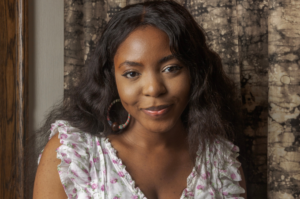
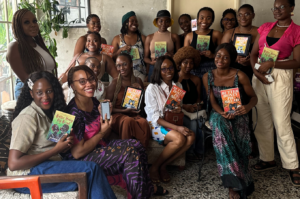
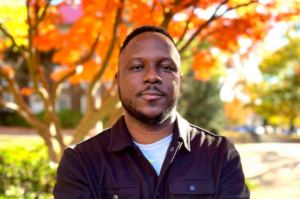
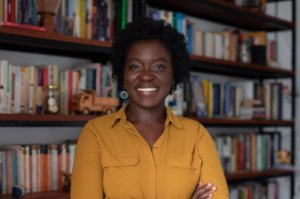


COMMENTS -
Reader Interactions